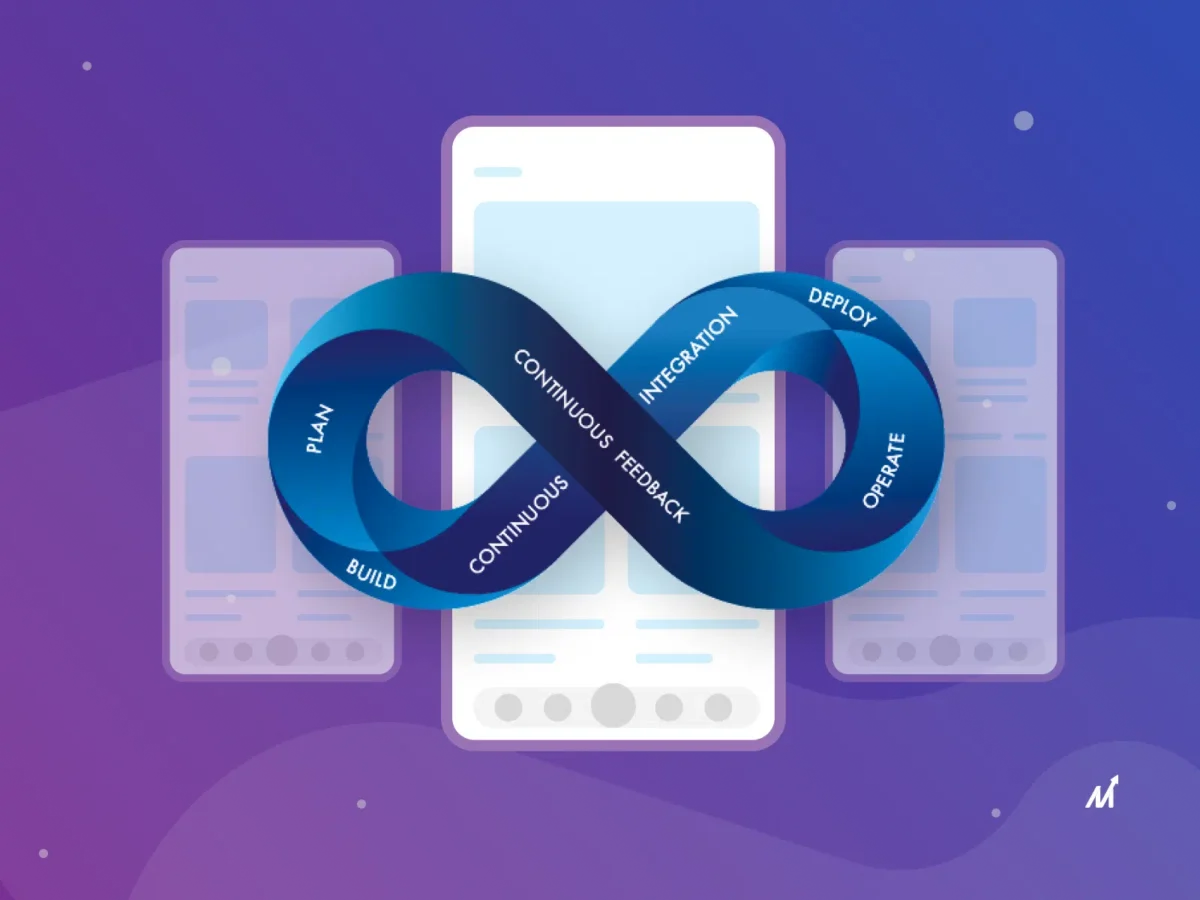DevOps for mobile includes a range of practices, tools, and principles aimed at helping teams build, test, and release apps more efficiently and reliably.
At its core, it’s an extension of the broader DevOps architecture that addresses the inherent challenges associated with building a mobile app.
Teams follow this approach to integrate automation tools and frameworks to enable frequent code commits, optimize testing across different platforms and devices, and simplify deployment.
What Challenges Does Mobile DevOps Solve and How?
Developing an app for mobile devices is a task in itself, especially when there are over 35 billion downloaded apps from the Play Store and App Store together.
And as it appears, the implementation of DevOps can address a lot of those challenges that come with traditional processes, such as device variety, complicated testing, high user demands, etc.
- Problem
The diversity of mobile devices, operating systems, and screen sizes
Each device has its unique features, and ensuring app functionality across this spectrum demands exhaustive testing. This challenge intensifies as new OS versions, device models, and configurations enter the market.
- Solution
Automation tools and frameworks enable continuous testing across various devices and OSs.
DevOps techniques like test automation, emulators, and device farms streamline testing efforts so that developers can identify and resolve compatibility issues as early as possible.
- Problem
The need for rapid and frequent updates
Operating system updates, security patches, or feature enhancements require swift adaptation to maintain app relevance. This rapid iteration pace can strain the traditional development lifecycle.
- Solution
DevOps CI/CD pipelines automate the build, test, and deployment processes.
Developers can efficiently roll out updates, reduce time-to-market, and enable rapid iterations without compromising quality.
- Problem
Security remains a looming concern
With sensitive user data in transit and at rest, vulnerabilities pose significant risks. However, ensuring security without affecting the pace of development is a tightrope walk.
- Solution
DevSecOps solutions integrate security measures throughout the development pipeline.
This proactive approach ensures that security is an integral part of the development process without impeding the pace of development.
- Problem
User experience (UX) holds paramount importance
Apps need to function flawlessly while delivering an intuitive user journey. Balancing the code optimization for performance with UX enhancements demands spot-on coordination among team members.
- Solution
DevOps encourages a user-centric approach by fostering collaboration between development, QA, and operations teams.
Continuous feedback loops and iterative improvements based on user insights obtained from monitoring tools and analytics help in enhancing both the app’s functionality and user experience.
- Problem
Deployment to app stores
Releasing a mobile app on the Play Store and App Store is a manual process involving having the right asset requirements, signing certificates, managing provisioning profiles, and so on. Developers must figure it out on their own.
- Solution
DevOps tackles the manual deployment process by automating the build and release pipeline.
Best DevOps tools like CI/CD platforms integrate directly with app store APIs, ensure consistency, reduce human error, and streamline the deployment process.
- Problem
The inherent silos between development, QA, and operations teams
Without seamless collaboration and streamlined workflows, miscommunication and inefficiencies can hinder the rapid delivery of quality apps.
- Solution
Shared responsibilities and streamlined workflows minimize miscommunication and inefficiencies.
DevOps tools for communication, version control, and project management facilitate transparent collaboration and quicker issue resolutiion.
APPBANAO
LEARN APP DEVELOPMENT
WITHOUT CODING
Key Concepts of Mobile DevOps
Now that you know the core challenges in mobile app development services, let’s understand the fundamental pillars that drive the solutions.
The 6 Cs of DevOps lay the groundwork for a robust and efficient development lifecycle, with each ‘C’ signifying a crucial stage.
1. Continuous Planning
Involves iterative planning cycles and constantly refining the app’s roadmap and feature set for a more responsive development process.
Objective: Aligning business goals through ongoing planning and feedback.
2. Continuous Integration
Developers frequently merge their code changes into a central repository, which triggers automated builds and tests.
Objective: Regularly integrating code changes from multiple developers into a shared repository.
3. Continuous Testing
Conducting automation testing methodologies that run continuously throughout the development lifecycle.
Objective: Ensuring app functionality, performance, and reliability across diverse devices and platforms.
4. Continuous Monitoring
It’s about using monitoring tools to track key performance indicators, user interactions, crashes, and other metrics after deployment.
Objective: Tracking app performance, user experience, and system health in real time.
5. Continuous Delivery
Focuses on automating the steps required to prepare a release, such as automating deployment scripts and creating artifacts.
Objective: Automating the delivery process to make releases ready for deployment at any time.
6. Continuous Deployment
This stage streamlines the process of making changes live with minimum human intervention.
Objective: Automating the deployment of code changes to production after passing all stages of testing.
Benefits of DevOps for Mobile App Development
According to Puppet, over 80% of organizations actively practice DevOps. This might go up to 94% by 2028.
From accelerating time-to-market to improving app quality, the benefits of DevOps implementation services in creating mobile apps go far beyond mere efficiency gains.
Let’s understand the manifold role of DevOps in mobile app development:

Accelerate App Launches at Warp Speed
Rapid iterations, automated testing, and streamlined deployment pipelines are the direct outcomes of DevOps practices.
As a result, you get reduced time-to-market for your mobile apps. This agility is crucial in this industry niche where user expectations and market trends continuously change.
Leverage Top-Tier App Quality
Continuous integration, testing, and monitoring ensure higher-quality mobile apps.
With automated testing across diverse devices and platforms, developers can catch bugs early and build more reliable and stable applications.
Maximize Efficiency and Productivity
Automation of repetitive tasks, such as testing and deployment, reduces manual effort.
This allows developers to focus on innovation and coding. Such heightened efficiency leads to increased productivity across the development lifecycle.
Scale Seamlessly and Adapt with Flexibility
With DevOps, teams can build mobile apps that adapt seamlessly to increasing user demand or changing requirements.
The flexibility inherent in DevOps practices ensures apps can evolve with growing business needs.
Optimize Resources and Cut Costs
By minimizing manual interventions and reducing rework through early bug detection, DevOps helps in cost savings and optimal resource utilization.
Additionally, with faster deployments and reduced downtime, the overall operational costs decrease with substantial savings.
How to Implement DevOps for Mobile App Development
Trying to put together a makeshift DevOps solution or revamping your existing infrastructure might seem like an option, but we firmly believe that investing in a dedicated solution yields greater value.
That’s why we’ve compiled the essential stages to implement mobile DevOps to help you build quality products as well as boost the agility of your development process.
Assess Your Current Processes and Culture
How are your existing development, testing, and deployment workflows?
Start by assessing your team’s familiarity with DevOps and identifying cultural barriers that might hinder the new process.
You might consider getting help from enterprise DevOps consultants at this point.
Set Clear Objectives and Goals
Next, you must define specific objectives aligned with your business goals.
For example, faster time-to-market, improved app quality, increased automation, or other such measurable Key Performance Indicators (KPIs) can track progress and success.
Promote a Cultural Shift
Initiate a cultural shift within your mobile app development team to foster collaboration and shared responsibilities.
One way to do this is by encouraging transparent communication and collaboration among dev, QA, and ops teams. They must value automation, iteration, and continuous improvement.
Select and Implement DevOps Tools
Choose appropriate DevOps tools tailored for mobile app development.
The list includes:
- Version control systems – Git
- CI/CD tools – Jenkins, GitLab CI
- Testing frameworks – Appium, XCTest
- Containerization tools – Docker
- Monitoring tools – Prometheus, Firebase Analytics
Automate Testing Across Devices and Platforms
Most importantly, utilize device farms, emulators, or cloud-based testing services to automate testing on a diverse range of mobile devices, operating systems, and screen sizes.
This will help you ensure app compatibility and functionality.
Conduct Regular Review and Continuous Improvement
Finally, conduct regular reviews of the DevOps processes, tools, and KPIs. Analyze the data collected from the monitoring tools along with user feedback to identify areas for improvement.
The goal is to emphasize a culture of continuous learning and evolution so that your team can adjust and optimize the DevOps pipeline on a continuous basis.
- Automate Digital Marketing & Social Media6 HoursBeginner0 Lessons0 Quizzes854 Students
Lorem ipsum dolor sit amet consectur adipiscing elit, sed do eiusmod tempor incididunt ut labore...
₹30.00 - Digital Marketing Hacking With Artificial Intelligence10 DaysAll levels0 Lessons0 Quizzes246 Students
Lorem ipsum dolor sit amet consectur adipiscing elit, sed do eiusmod tempor incididunt ut labore...
Free - Digital Marketing Professional Training Program10 WeeksExpert0 Lessons0 Quizzes654 Students
Lorem ipsum dolor sit amet consectur adipiscing elit, sed do eiusmod tempor incididunt ut labore...
₹50.00₹40.00 - How To Start & Grow Your Own Digital Agency15 HoursIntermediate0 Lessons0 Quizzes454 Students
Lorem ipsum dolor sit amet consectur adipiscing elit, sed do eiusmod tempor incididunt ut labore...
₹40.00₹35.00 - Launch Your Digital Marketing Agency10 HoursIntermediate0 Lessons0 Quizzes351 Students
Lorem ipsum dolor sit amet consectur adipiscing elit, sed do eiusmod tempor incididunt ut labore...
₹50.00






